-
REVIEW
Nursing process in mental health: an integrative literature review
Revista Brasileira de Enfermagem. 2017;70(1):220-230
01-01-2017
Abstract
REVIEWNursing process in mental health: an integrative literature review
Revista Brasileira de Enfermagem. 2017;70(1):220-230
01-01-2017DOI 10.1590/0034-7167-2016-0031
Views0See moreABSTRACT
Objective:
to identify evidences from the literature on the application of nursing process in care developed by the nurse in mental health.
Method:
integrative literature review between 1990 and 2013, in the PubMed, Scopus, CINAHL and LILCACS bases. Descriptors: nursing processes, mental health, nursing care.
Results:
19 papers were identified. Limited and partial usage of the nursing process in care established by a therapeutic relationship that respects the patient’s individuality. We observe care proposals systematized for patients that present pathological aspects in the limits between the physical and psychical, which might be a response to the influence of the practice based on evidences.
Conclusion:
it was found an antagonistic movement between care based on the relationship and located in the standardization of diagnoses that respond to physical malaise. A lack of evidence was verified for the usage of the nursing process in mental health, and we point at the necessity for the creation of new possibilities for dialogue between relational and biological perspectives.
-
REVIEW
Nursing practice in home care: an integrative literature review
Revista Brasileira de Enfermagem. 2017;70(1):210-219
01-01-2017
Abstract
REVIEWNursing practice in home care: an integrative literature review
Revista Brasileira de Enfermagem. 2017;70(1):210-219
01-01-2017DOI 10.1590/0034-7167-2016-0214
Views0See moreABSTRACT
Objective:
analyze scientific production on nursing practice in home care.
Method:
integrative review employing databases LILACS, BDENF, IBECS, and MEDLINE. Studies in Spanish, English, and Portuguese were included, regardless of publishing date.
Results:
after analyzing 48 articles, it was found that nursing practice in home care is complex, employing a multitude of actions by using three technologies: soft; soft-hard especially; and hard. Challenges related to the home-care training process are reported in the literature. Nurses use knowledge from their experience and scientific recommendations in conjunction with their reflections on the practice.
Conclusion:
home nursing practice is fundamental and widespread. Relational and educational actions stand out as necessary even in technical care, with a predominant need for home-care training.

-
REVIEW
Nonpharmacological interventions to improve quality of life in heart failure: an integrative review
Revista Brasileira de Enfermagem. 2017;70(1):198-209
01-01-2017
Abstract
REVIEWNonpharmacological interventions to improve quality of life in heart failure: an integrative review
Revista Brasileira de Enfermagem. 2017;70(1):198-209
01-01-2017DOI 10.1590/0034-7167-2016-0112
Views0See moreABSTRACT
Objective:
to identify articles that assessed the effectiveness or efficacy of nonpharmacological interventions to improve quality of life of people with heart failure in the literature.
Method:
an integrative literature review was performed in Lilacs, MedLine and SciELO databases, including randomized or nonrandomized clinical trials and quasi-experimental studies published between 2003 and 2014, in Portuguese, English or Spanish.
Results:
twenty-three studies were included. The categories of nonpharmacological interventions that improved quality of life of people with heart failure were: Remote health monitoring, Instructions on health practices, Physical activity follow-up and Traditional Chinese Medicine practices.
Conclusion:
these results can guide the selection of interventions to be implemented by health professionals that treat people with heart failure. Future systematic reviews with meta-analyses are needed in order to identify the most effective interventions for improving these individuals’ quality of life.

-
REVIEW
Quality of working life: assessment of intervention studies
Revista Brasileira de Enfermagem. 2017;70(1):189-197
01-01-2017
Abstract
REVIEWQuality of working life: assessment of intervention studies
Revista Brasileira de Enfermagem. 2017;70(1):189-197
01-01-2017DOI 10.1590/0034-7167-2015-0069
Views0See moreABSTRACT
Objective:
to analyze the production of knowledge about interventions on quality of working life.
Method:
integrative review study. The following databases were used for study selection: SciELO, Medline and PubMed.
Results:
the sample included 25 national and international articles that described programs and methods to acquire healthy habits at the workplace and attenuate its mental demands.
Conclusion:
by observing the number of businesses throughout the world, a low number of programs addressing workers’ health and well-being can be found, and the establishment of efficient policies at institutions could improve this situation.

-
REVIEW
Health literacy for people living with HIV/Aids: an integrative review
Revista Brasileira de Enfermagem. 2017;70(1):180-188
01-01-2017
Abstract
REVIEWHealth literacy for people living with HIV/Aids: an integrative review
Revista Brasileira de Enfermagem. 2017;70(1):180-188
01-01-2017DOI 10.1590/0034-7167-2015-0052
Views0See moreABSTRACT
Objective:
to analyze knowledge produced by research about health literacy for adult with HIV/Aids.
Method:
an integrative literature review, using six databases, was conducted between January and April of 2014. The descriptors aids and Health Literacy were used, in Portuguese, English and Spanish. A total of 130 articles were found and 14 were selected. Three categories were identified: educational technologies and health literacy for HIV/Aids; assessment of health literacy of patients with HIV/Aids; and health literacy and adherence to antiretroviral therapy.
Results:
analysis of health literacy, socioeconomic status and educational level of people living with HIV/ Aids was essential for implementation of educational strategies that increased adherence to health guidance.
Conclusion:
this study showed the importance of health literacy for working with people living with HIV/Aids, especially considering individuals who did not possess the minimum necessary for survival, which makes it relevant and encourages further research on the topic.

-
REVIEW
Letramento em saúde para pessoas com HIV/Aids: revisão integrativa
Revista Brasileira de Enfermagem. 2017;70(1):180-188
01-01-2017
Abstract
REVIEWLetramento em saúde para pessoas com HIV/Aids: revisão integrativa
Revista Brasileira de Enfermagem. 2017;70(1):180-188
01-01-2017DOI 10.1590/0034-7167-2015-0052
Views0See moreRESUMEN
Objetivo:
analizar el conocimiento producido por la investigación sobre la salud de alfabetización para adultos con VIH/SIDA.
Método:
una revisión integradora de la literatura, con seis bases de datos, se llevó a cabo entre enero y abril de 2014. Los descriptores SIDA y Educación de la Salud se utilizaron, en portugués, inglés y español. Se encontró un total de 130 artículos y se seleccionaron 14. Se identificaron tres categorías: tecnologías de la educación y alfabetización de la salud para el VIH/SIDA; evaluación de conocimientos sobre la salud de los pacientes con VIH/SIDA; y conocimientos sobre la salud y la adherencia a la terapia antirretroviral.
Resultados:
análisis de los conocimientos sobre la salud, el estatus socioeconómico y nivel educativo de las personas que viven con el VIH / SIDA era esencial para la implementación de estrategias educativas que el aumento de la adherencia a la orientación de la salud.
Conclusión:
Este estudio demostró la importancia de la alfabetización en salud para trabajar con personas que viven con el VIH / SIDA, especialmente teniendo en cuenta a las personas que no poseen el mínimo necesario para la supervivencia, lo que hace que sea aún más relevante y alienta la investigación sobre el tema.
-
Factors that interfere with the response of nurses in the monitoring of clinical alarms
Revista Brasileira de Enfermagem. 2017;70(1):172-179
01-01-2017
Abstract
Factors that interfere with the response of nurses in the monitoring of clinical alarms
Revista Brasileira de Enfermagem. 2017;70(1):172-179
01-01-2017DOI 10.1590/0034-7167-2015-0092
Views0See moreABSTRACT
Objective:
The objective of the present study was to identify and synthesize the best empirical evidence found on factors that influence the response of nurses regarding clinical alarms.
Method:
An integrative literature review was conducted with searches undertaken in ten electronic databases restricted to the period from 2005 to 2016.
Results:
Eight articles were included by cross-checking the descriptors selected.
Conclusion:
In the analysis of the studies, the following possible factors that might interfere with the response of nurses in the monitoring of clinical alarms were found: high number of false alarms, inaudibility of alarms due to the competition of sounds, difficulty in distinguishing the urgency of alarms, and increase in noise caused by the raise in the number of alarms.
-
RESEARCH
Discourses on discharge care for children with special healthcare needs
Revista Brasileira de Enfermagem. 2017;70(1):163-171
01-01-2017
Abstract
RESEARCHDiscourses on discharge care for children with special healthcare needs
Revista Brasileira de Enfermagem. 2017;70(1):163-171
01-01-2017DOI 10.1590/0034-7167-2016-0248
Views0See moreABSTRACT
Objectives:
analyze the discourse of healthcare professionals and families on the continuous and complex care for children with special healthcare needs; understand hospital discharge as a process centered on children demands and family learning.
Method:
qualitative research conducted between 2013 and 2015 through semi-structured interviews, document analysis and the sensitive creative method; the participants were ten children with special healthcare needs, six professionals and eleven family members from a public pediatric teaching hospital in Rio de Janeiro. The data underwent critical discourse analysis.
Results:
at discharge, family caregivers should learn innovative care to guarantee the maintenance of their children’s lives at home, but preparation is limited.
Conclusion:
the clinicians and the families pointed out Nurse as the most qualified professional for this preparation, since caring for these children requires nursing care skills.
-
ORIGINAL ARTICLE
Patient safety incidents identified by the caregivers of hospitalized children
Revista Brasileira de Enfermagem. 2019;72(3):707-714
06-27-2019
Abstract
ORIGINAL ARTICLEPatient safety incidents identified by the caregivers of hospitalized children
Revista Brasileira de Enfermagem. 2019;72(3):707-714
06-27-2019DOI 10.1590/0034-7167-2018-0484
Views0See moreABSTRACT
Objective:
to analyze patient safety incidents identified by caregivers of hospitalized children.
Method:
a qualitative, exploratory-descriptive study was carried out with 40 caregivers of children hospitalized in three hospital institutions in the city of Porto Alegre, Rio Grande do Sul State, Brazil, from April to December 2016. Semi-structured, recorded and transcribed interviews were carried out in their entirety, submitted to a thematic analysis using the NVivo 11.0 software.
Results:
reports related to falls, infant feeding, patient/caregiver identification, medication process, communication, hand hygiene and hygiene of the hospital environment, spread of diseases, relations between caregivers and professionals and care processes/procedures were all cited.
Final considerations:
communication and the relations among caregivers and professionals are the main contributory factors for patient safety incidents, interfering with the quality of care. The participation of caregivers and engagement in child care may be strategies to be developed to promote a safety culture.
-
ORIGINAL ARTICLE
Tuberculosis: health care and surveillance in prisons
Revista Brasileira de Enfermagem. 2019;72(5):1304-1310
09-16-2019
Abstract
ORIGINAL ARTICLETuberculosis: health care and surveillance in prisons
Revista Brasileira de Enfermagem. 2019;72(5):1304-1310
09-16-2019DOI 10.1590/0034-7167-2018-0260
Views0ABSTRACT
Objective:
To identify tuberculosis-related health care and surveillance actions in Prison Health Units.
Method:
Cross-sectional study, of quantitative, exploratory and descriptive character. We visited 13 Teams of Prison Health, and nurses and technicians were interviewed regarding epidemiological surveillance instruments, physical structure and materials.
Results:
Search for respiratory symptoms in admission was reported by 6 (46.2%) of the teams, and the smear microscopy was the most requested test. The Logbook of Respiratory Symptoms and the Logbook for Monitoring Tuberculosis Cases were used in 7 (53.8%) institutions. Two of them (15.4%) had a location for sputum collection and 1 (7.7%) had a radiographer. The Directly Observed Therapy was reported in 7 (53.8%) units.
Conclusion:
Health care actions related to the search for respiratory symptoms and Directly Observed Therapy should be expanded, as well as surveillance actions and recording in official documents of the National Tuberculosis Control Program.
Keywords:Cross-Sectional StudiesDelivery of Health CarePrisonsPublic Health SurveillanceTuberculosisSee more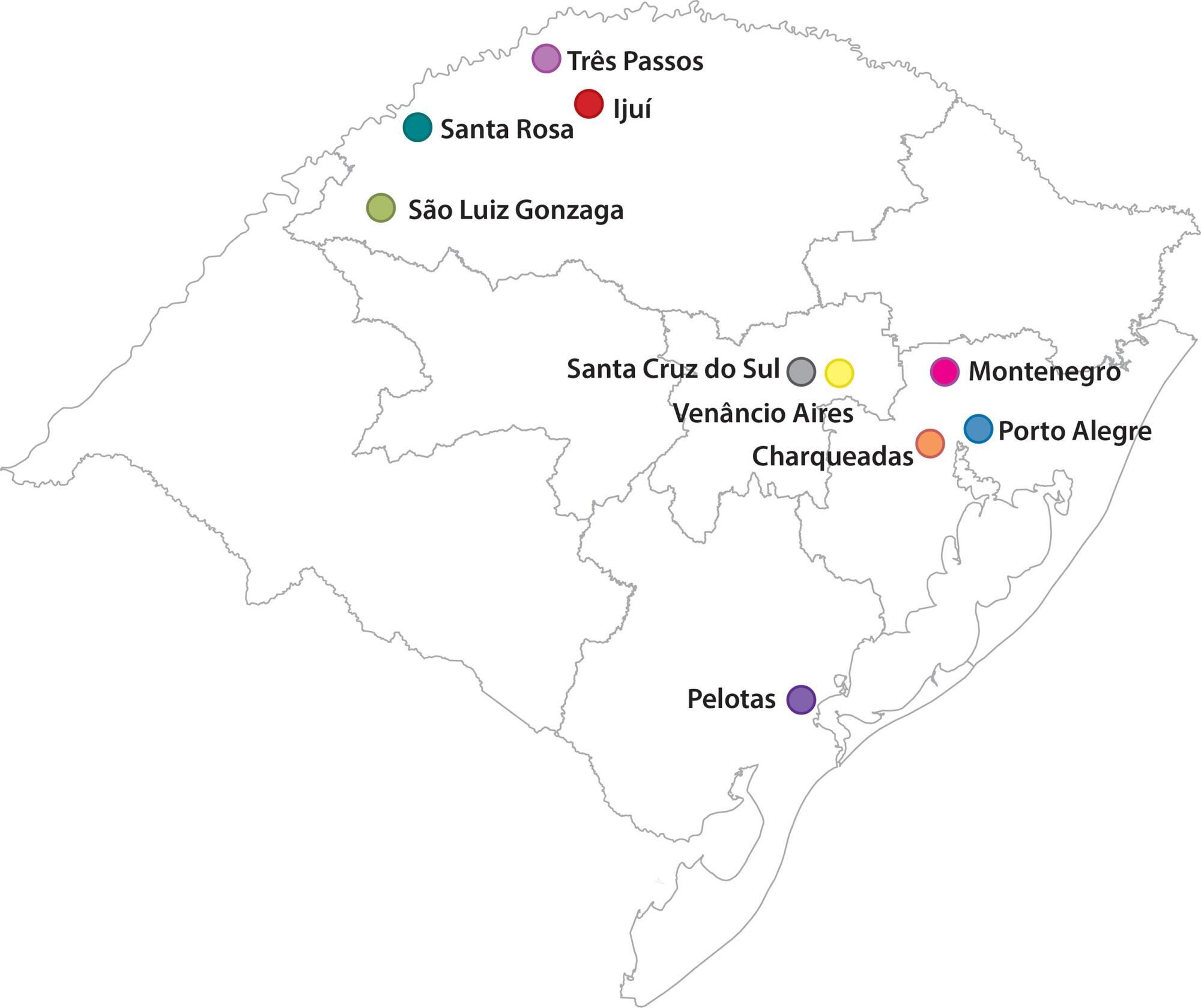
-
ORIGINAL ARTICLE
Adaptation and validation of the Advanced Practice Nursing Competency Assessment Instrument
Revista Brasileira de Enfermagem. 2022;75(5):e20210582
03-07-2022
Abstract
ORIGINAL ARTICLEAdaptation and validation of the Advanced Practice Nursing Competency Assessment Instrument
Revista Brasileira de Enfermagem. 2022;75(5):e20210582
03-07-2022DOI 10.1590/0034-7167-2021-0582
Views0ABSTRACT
Objective:
To adapt and validate the content of the Advanced Practice Nursing Competency Assessment Instrument (APNCAI) to Brazilian culture.
Methods:
This is a methodological study that followed the stages of translation, synthesis, back translation, evaluation by a committee of five specialists, pre-test with 31 nurses, and evaluation by the author of the original instrument. The Content Validity Index (minimum 0.90) and the modified Kappa (minimum 0.74) were calculated to evaluate the content.
Result:
In the first round of content evaluation, 18 items had to be altered because they did not reach the minimum values established. Three items have not reached a consensus in the second round and had to be sent to the author of the original version. In the pre-test, 13 items were returned to the specialists because they suffered content changes.
Conclusion:
The Advanced Practice Nursing Competency Assessment Instrument (APNCAI) – Brazilian version was cross-culturally adapted, and its content was validated.
Keywords:Advanced Practice NursingClinical CompetenceRole of the Nursing ProfessionalTranslationValidation StudiesSee more -
REVIEW
Frailty syndrome in the elderly: conceptual analysis according to Walker and Avant
Revista Brasileira de Enfermagem. 2020;73:e20190601
07-29-2020
Abstract
REVIEWFrailty syndrome in the elderly: conceptual analysis according to Walker and Avant
Revista Brasileira de Enfermagem. 2020;73:e20190601
07-29-2020DOI 10.1590/0034-7167-2019-0601
Views0See moreABSTRACT
Objective:
To analyze the concept of “frailty syndrome” in the literature, according to the method proposed by Walker and Avant.
Methods:
It is a concept analysis, guided by the method proposed by Walker and Avant, made operational through an integrative literature review. The search in a scientific database was carried out using the descriptors: Frail elderly, syndrome, phenotype, geriatric assessment, and aging. The literary corpus comprised 66 studies. Results: The study found the antecedents and attributes (categorized as physical, sociodemographic, and behavioral/environmental) that integrate the signs and symptoms evidenced in the “frailty syndrome,” as well as the consequences of this concept. The variables were analyzed with emphasis on the conceptions that influence the frailty process of the elderly.
Conclusion:
The study demonstrated the complexity arising from the multifactorial genesis of the referred syndrome, emphasizing the specificities of the elderly’s frailty. However, we recommend conducting further research involving the phenomenon in question to understand the construct better.
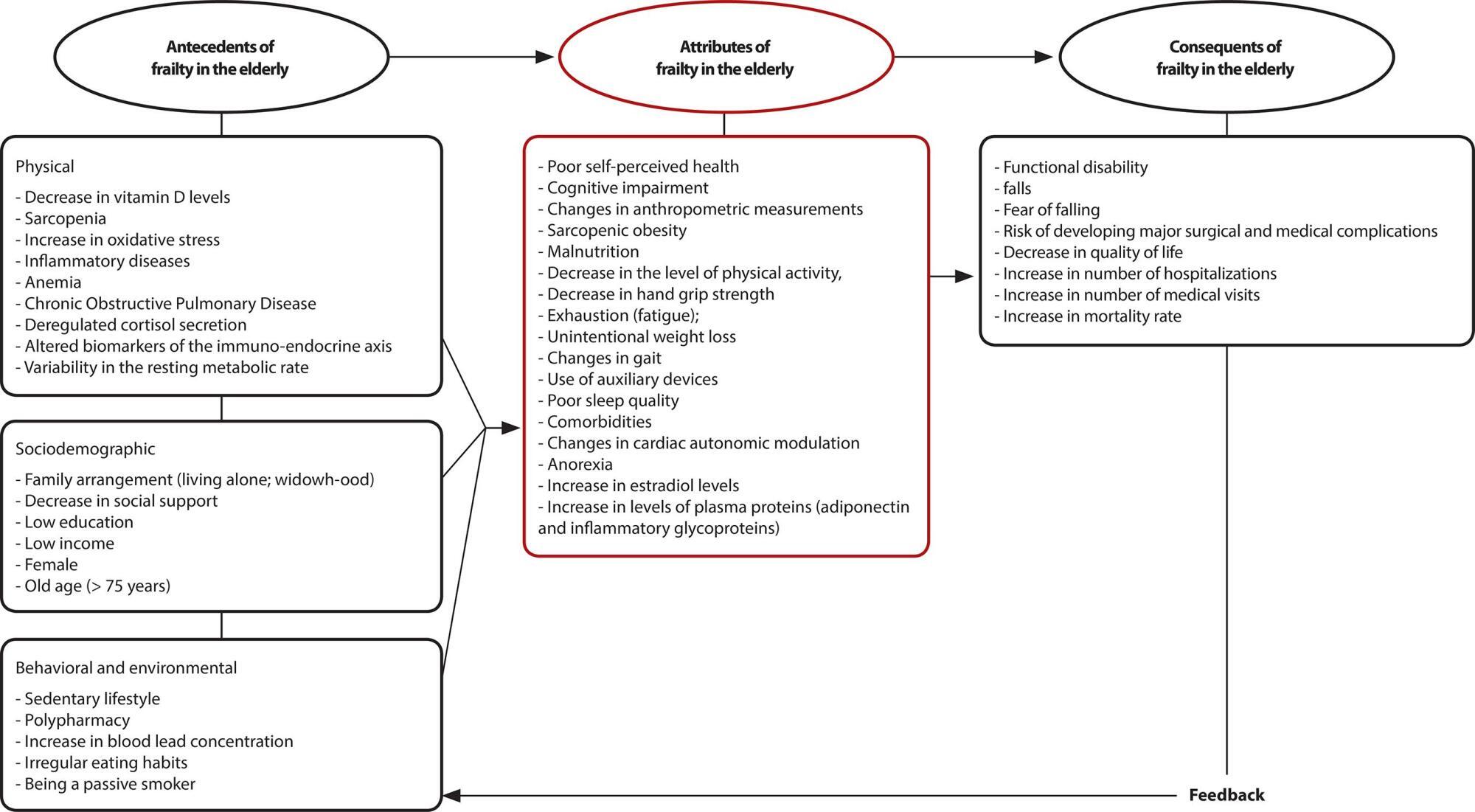
-
Construct validation: coping with HIV/AIDS in Primary Health Care
Revista Brasileira de Enfermagem. 2019;72(5):1173-1181
09-16-2019
Abstract
Construct validation: coping with HIV/AIDS in Primary Health Care
Revista Brasileira de Enfermagem. 2019;72(5):1173-1181
09-16-2019DOI 10.1590/0034-7167-2018-0734
Views0ABSTRACT
Objective:
To validate the construct and measure the trustworthiness of a questionnaire aimed at assessing HIV/AIDS coping actions developed by health professionals in Primary Health Care.
Method:
A methodological study carried out with 397 primary health care professionals in two municipalities in the Northeast region of Brazil. The construct validity was developed by the exploratory and confirmatory factor analysis, and the reliability analyzed by the reliability and reproducibility.
Results:
The validation determined six factors retention that composed the six domains of the questionnaire. Internal consistency was 0.91 and quality of the confirmatory analysis adjustment was 0.998 for Goodness of Fit Index. The domains presented Kappa values between 0.833 and 0.997.
Conclusions:
The final questionnaire was composed of 18 items and presented feasibility of application, and potential to evaluate actions for HIV/AIDS control in Primary Health Care.
Keywords:Acquired Immunodeficiency SyndromeHealth EvaluationHIVPrimary Health CareValidation StudiesSee more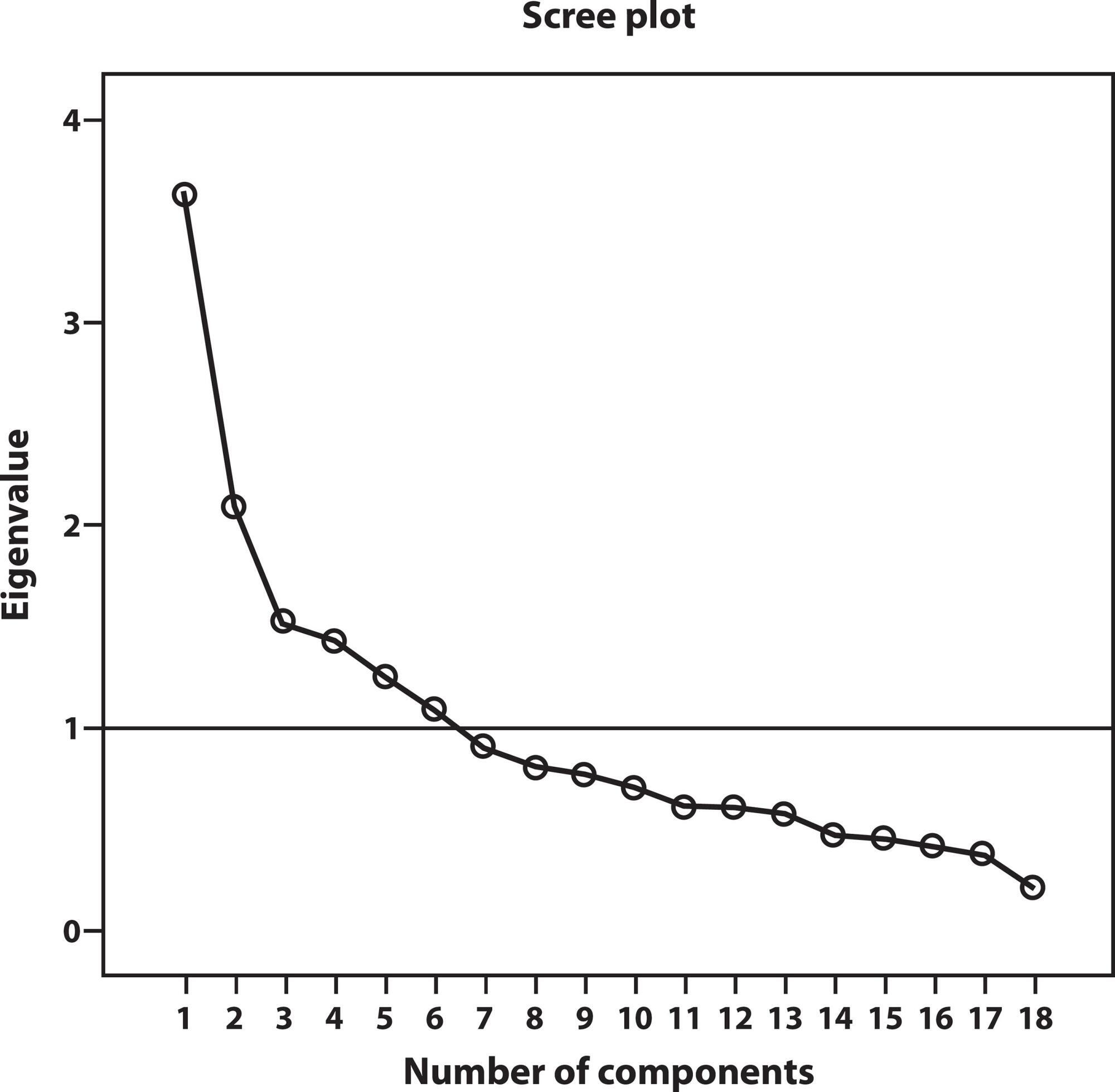
-
Development of middle-range theories in nursing
Revista Brasileira de Enfermagem. 2020;73(1):e20170893
02-10-2020
Abstract
Development of middle-range theories in nursing
Revista Brasileira de Enfermagem. 2020;73(1):e20170893
02-10-2020DOI 10.1590/0034-7167-2017-0893
Views0See moreABSTRACT
Objective:
To identify in the literature how Middle-Range Theories (MRT) are being developed in Nursing.
Method:
Integrative review on the databases Lilacs (Latin American and Caribbean Literature in Health Sciences), Scopus, Cinahl (Cumulative Index to Nursing and Allied Health Literature), Web of Science and PubMed portal, using the keywords middle range theory and nursing, as well its Portuguese correspondents (Lilacs), and the Boolean operator AND. The sample included 25 articles.
Results:
All articles presented concepts related to MRT. Most developed a synthesis picture. Some theories have formulated specific propositions, hypotheses, and names. Only 16 articles cited the methodological framework, while 22 used theories or models for theoretical foundation and 11 carried out literature reviews.
Final considerations:
The development of MRT included the presentation of fundamental concepts, synthesis, propositions, hypotheses and specific name. The MRT is recognized as a way of developing knowledge to guide the nursing practice.
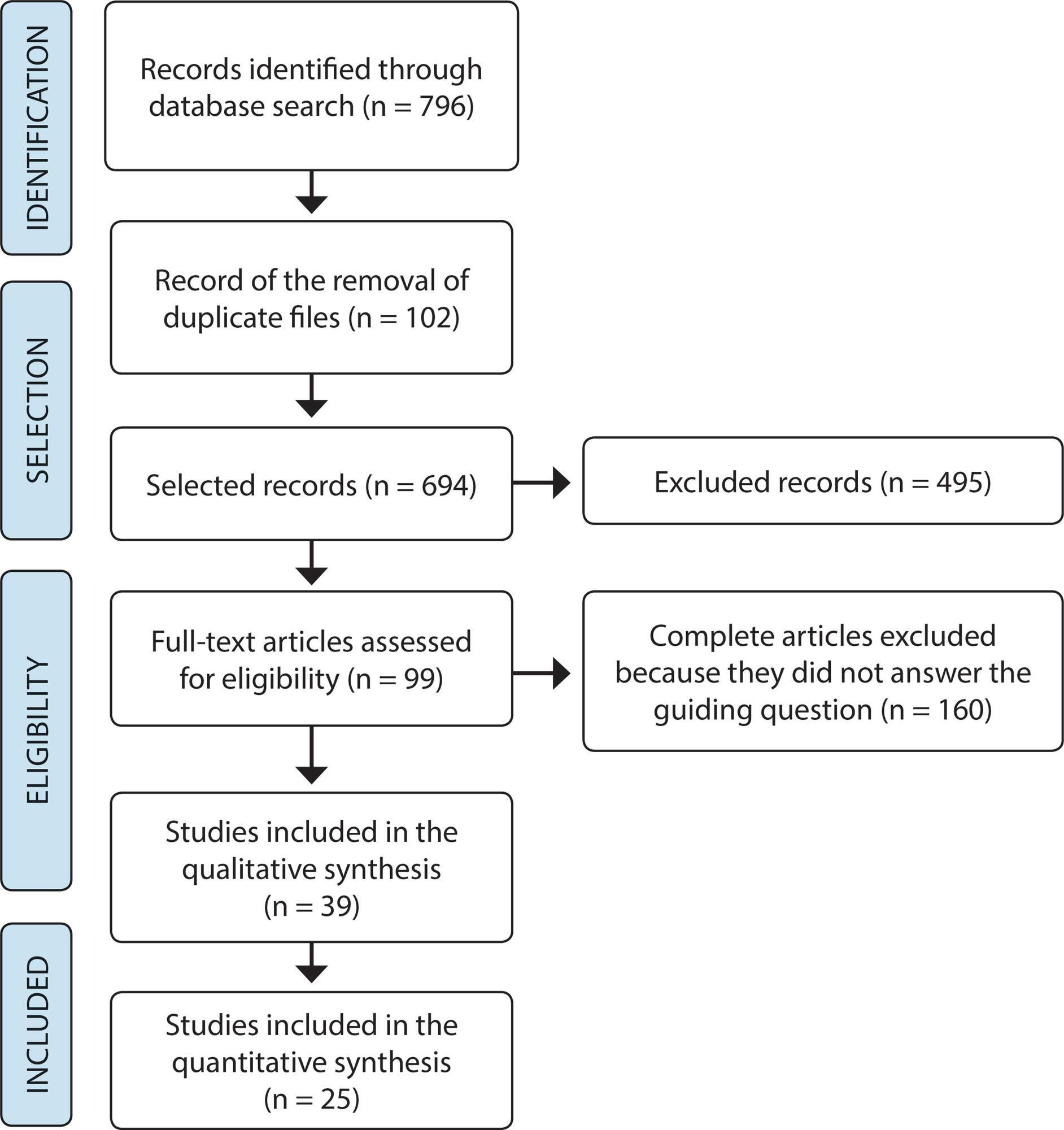
-
REVIEW
Assessment of patient safety culture in Brazilian hospitals through HSOPSC: a scoping review
Revista Brasileira de Enfermagem. 2021;74(6):e20201315
08-20-2021
Abstract
REVIEWAssessment of patient safety culture in Brazilian hospitals through HSOPSC: a scoping review
Revista Brasileira de Enfermagem. 2021;74(6):e20201315
08-20-2021DOI 10.1590/0034-7167-2020-1315
Views0ABSTRACT
Objectives:
to describe, from literature, the characteristics of patient safety culture in Brazilian hospitals that applied the Hospital Survey on Patient Safety Culture.
Methods:
this is a scoping review. A search was performed in the databases LILACS, PubMed, SciELO, CINAHL, Web of Science, Scopus and in the CAPES Dissertations and Theses Database in September and October 2020.
Results:
thirty-six studies were identified. Nine studies identified strengthened areas such as: “teamwork within the units”, “expectations of supervisor/boss and actions promoting safety”, “organizational learning”, “support of hospital management for patient safety” and “frequency of report of events”. As a critical area, the dimension “non-punitive response to error” was evidenced in 30 of 36 studies.
Conclusions:
the identification of areas of strength and critical areas of safety culture is relevant to encourage improvement of patient safety problems in an institution.
Keywords:HospitalsOrganizational CulturePatient SafetyQuality Indicators, Health CareQuality of Health CareSee more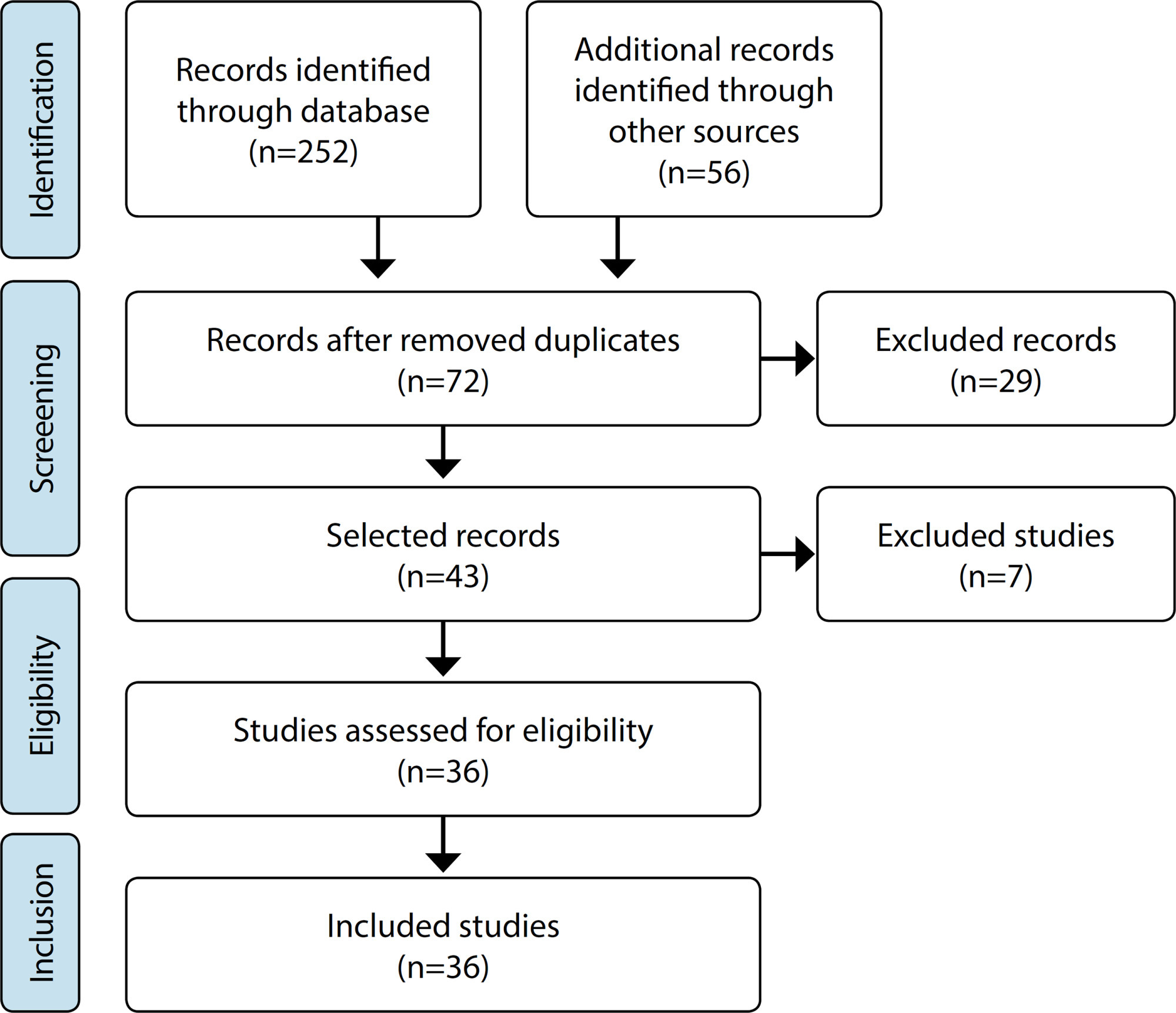
-
ORIGINAL ARTICLE
Low-laser light therapy in venous ulcer healing: a randomized clinical trial
Revista Brasileira de Enfermagem. 2022;75(3):e20210396
11-12-2022
Abstract
ORIGINAL ARTICLELow-laser light therapy in venous ulcer healing: a randomized clinical trial
Revista Brasileira de Enfermagem. 2022;75(3):e20210396
11-12-2022DOI 10.1590/0034-7167-2021-0396
Views0ABSTRACT
Objectives:
to compare the effect of adjuvant low-laser light therapy versus conventional treatment alone on venous ulcer healing.
Methods:
this is a randomized clinical trial with 40 patients randomized equally to a control group (topical and compressive treatment) and intervention group (adjuvant low-laser light therapy). Outcomes of interest were Wound Healing: Secondary Intention and Tissue Integrity: Skin & Mucous Membranes, as described in the Classification of Nursing Outcomes/NOC.
Results:
groups with similar sociodemographic and clinical characteristics. Eighty-two ulcers were assessed, with an average duration of 1 to 5 years, in 1,066 nursing consultations, with a statistically significant difference in the time and number of healed ulcers (intervention group). There was a significant improvement in the nursing outcomes under study and in eight clinical indicators.
Conclusions:
low-laser light therapy improves and reduces tissue regeneration time, contributing to advances in wound treatment.
Keywords:Low-Laser Light TherapyOutcome AssessmentStandardized Nursing TerminologyVenous UlcerWound HealingSee more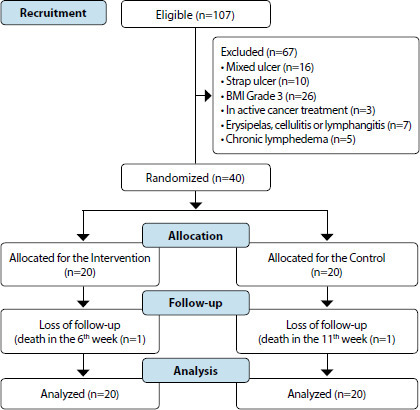
Search
Search in:
Nuvem de Tags
Aged (144) Atenção Primária à Saúde (239) COVID-19 (104) Cuidados de Enfermagem (269) Educação em Enfermagem (151) Educação em Saúde (139) Enfermagem (930) Estudos de Validação (131) Health Education (144) Idoso (208) Mental Health (149) Nursing (987) Nursing Care (306) Patient Safety (151) Primary Health Care (284) Qualidade de Vida (104) Quality of Life (106) Saúde Mental (145) Segurança do Paciente (150) Validation Studies (108)



